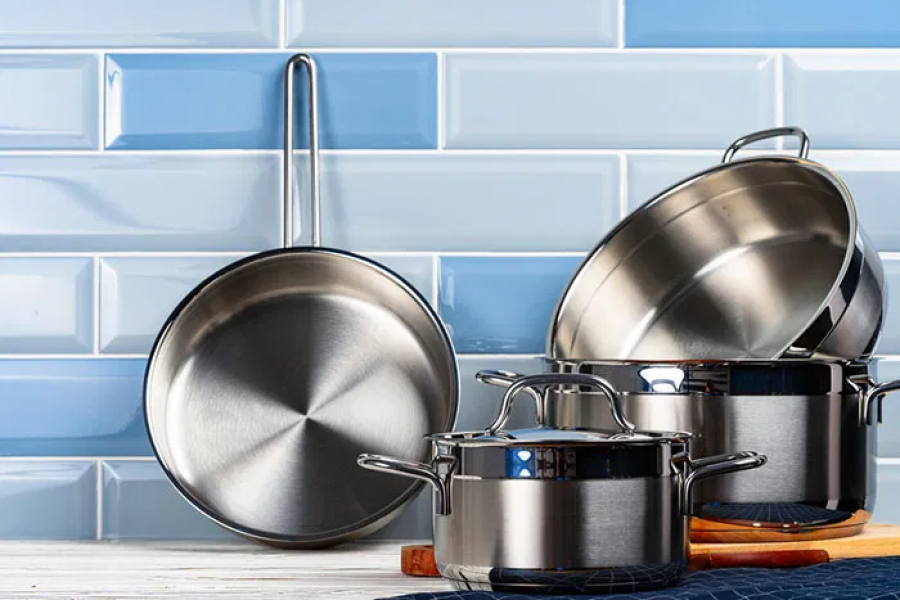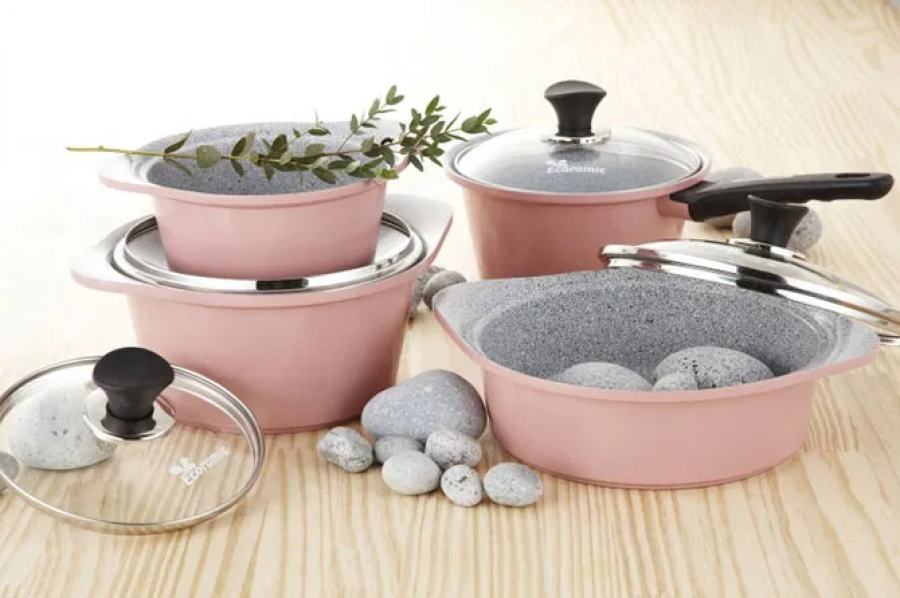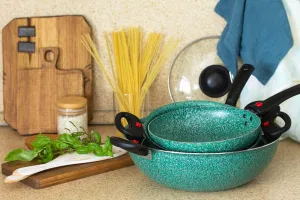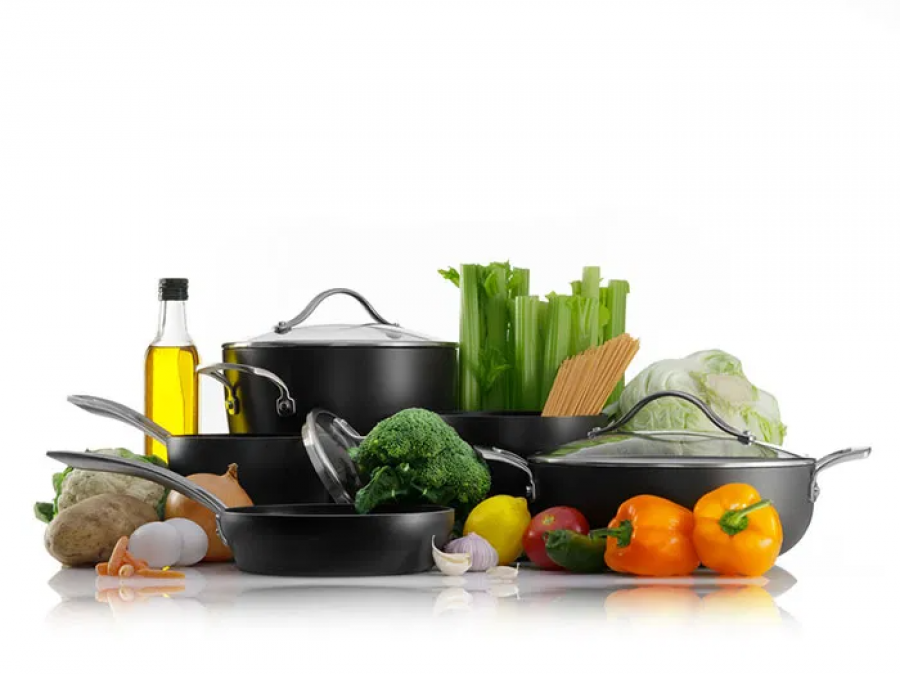Here are detailed reviews and full comparison between hard anodized vs ceramic cookware. Read below to know which one you should buy.
With the introduction of various cooktops, cooking styles, and exposure to health risks – there has been an influx in the types of cookware materials. Ranging from natural minerals to artificial alloys, cookware today is available in all shapes and sizes. In this guide, I will compare two distinct cookware materials – Hard Anodized aluminum, and ceramic – and conclude which one should have a place in your kitchen.
Hard Anodized vs Ceramic cookware: Let’s get started!
Hard Anodized vs Ceramic Cookware: Full Reviews
Hard Anodized Aluminum Cookware Review

Hard-Anodized cookware material has become popular amongst cooking enthusiasts who prefer durable nonstick cookware that is non-toxic. The making of hard-anodized starts at the base of soft aluminum, which is a natural element of earth. Then, the surface of the cookware is hardened to become 30% harder than stainless steel. It is done through a chemical process of immersing aluminum in an acid bath.
This increases the durability of the material and forms a smooth glass-like surface, which is similar to nonstick cookware. Hard-Anodized is a popular material with professional cooks because of its scratch-resistant durability, nonstick feature, and non-toxic surface.
Is Hard Anodized Cookware Safe?
Hard anodized aluminum has a surface that is hardened to be 30% stronger than stainless steel and transformed into a smooth surface. This limits the uppermost layer of the cookware from being released as toxic fumes when in contact with heat. Although, there is a risk of some of the aluminum – which has been hardened through a chemical process – of being leached into the food.
Therefore, it is important to maintain and care for your hard-anodized aluminum cookware and ensure that the uppermost surface is safe from being chipped away. Overall, this material is one of the best non-toxic cookware materials and keeps your food healthy and safe.
Advantages of using Hard Anodized Aluminum Cookware
Hard-Anodized offers one of the most efficient nonstick cookware materials. It requires very less greasing or oiling to cook food, whether it’s for cooking or baking.
This material is compatible with gas stoves, as well as electric stoves. This makes it a viable option for modern kitchens.
Hard-Anodized has been ingeniously engineered to be extremely durable – it is 30% harder than stainless steel. This material is scratch-resistant and can withstand robust use.
With the right detergent, cleaning hard-anodized aluminum is a breeze. It does not require any specific maintenance techniques, and it is dishwasher safe.
Hard anodized avails good thermal conductivity – it can transfer and retain heat exceptionally, ensuring that your food is cooked evenly and thoroughly
Disadvantages of using Hard Anodized Aluminum Cookware
Because it reacts to certain detergents, you must go through the ingredients of the detergent properly – or else, you might end up damaging the uppermost layer of the cookware.
Hard-Anodized is relatively more expensive than most materials and costs more than ceramic.
It is not compatible with induction cooktops.
MORE ABOUT HARD ANODIZED COOKWARE:
Best Hard Anodized Cookware Set – Buyer’s Guide
Hard Anodized vs Stainless Steel Cookware – Which Is The Best?
Ceramic Cookware Review

Ceramic cookware is one of the most environmental-friendly and non-toxic materials available in the market. It is nonstick and costs relatively less than most cookware materials. Ceramic cookware is available in various styles and colors, which adds to the aesthetic of your kitchen. This material is made from an amalgam of natural minerals with ceramic coating.
More importantly, the uppermost layer consists of sulfur dioxide and the oleophobic and hydrophobic elements; this ensures that the coating remains resistant to oil and grease. Because of its natural minerals’ base, like quartz, sand, clay, etc. ceramic cookware is free of toxic fumes and is environmental-friendly.
Is Ceramic Cookware Safe?
Ceramic cookware is one of the safest materials. It is made up of natural elements that do not release any toxic fumes and are very environmental-friendly. The main issue with ceramic cookware is that the uppermost layer can chip away if you clean it vigorously.
You would be required to do so if you use a lot of oil or butter while cooking food – this can lead to a sticky, stubborn layer on the coating of the ceramic cookware. The debris of the coating can leach into the food, which is detrimental to health. To avoid this, you simply have to use less oil while cooking.
Advantages of using Ceramic Cookware
Ceramic cookware is great for your health as it does not release toxic fumes and is environmental-friendly. Moreover, this material does not leach into your food, as its constituent is natural minerals.
This material is relatively cheap and affordable. Additionally, ceramic cookware is available in various styles and colors.
It is compatible with stovetops, ovens, microwaves, and even grills – depending on the brand you have brought it from.
They are multi-purpose, and can also be used as serving platters.
Ceramic is a good conductor of heat and distributes heat evenly, also retains it well to keep the food warm.
Disadvantages of using Ceramic Cookware
Ceramic is not a durable material – it can weather down in three years. The coating can last long if you maintain it with care, but if not, then it will deteriorate faster.
This material cannot withstand high levels of temperature, and can only perform with low or medium fire.
You cannot use metal utensils on it while cooking.
It is not dishwasher safe.
MORE ABOUT HARD CERAMIC COOKWARE:
Ceramic vs Teflon – Which Cookware Should You Choose?
Ceramic vs Stainless Steel – Which Cookware Fits Your Kitchen?
Hard Anodized vs Ceramic Cookware: The Similarities and Differences

1. Compatibility and Versatility
Hard-Anodized aluminum cookware is compatible with gas stovetop, glass cooktops, ovens, grills, and even electric cooktops. They can withstand good amounts of heat, offering you to cook food faster without any repercussions. Hard-Anodized is a good weight, which allows you to maneuver the cookware properly, and indulge in various cooking styles – even baking.
Ceramic cookware is compatible with stovetops, ovens, microwaves, and even grills. This material works great at a low or medium level of heat, which allows you to enjoy cooking styles such as sautéing, making broth, cooking. Some ceramic alloys are even compatible with grills and induction.
PS: The winner of this round is Ceramic cookware, as it offers a wider range of compatibility.
2. Durability and Sustainability
Hard-Anodized Aluminum has been specifically engineered through a chemical process so that it becomes 30% harder than stainless steel. The acid bath, which hardens the naturally soft aluminum, increases the durability of the cookware. Its surface is scratch-resistant, which helps in sustaining the hard-anodized material.
Ceramic cookware is not durable; it is delicate material as compared to hard-anodized. Adding to this, the uppermost layer of the cookware is a nonstick coating that can chip away with vigorous cleaning. Therefore, it does not sustain well.
PS: It is clear that Hard Anodized Aluminum is a much better and competent cookware material when it comes to sustainability and durability.
3. Performance
Hard-Anodized cookware has good thermal conductivity and can withstand even high levels of heat. It is durable and retains heat well because of its hardened surface. This material is compatible with stovetops, ovens, grills, and even electric cooktops, which enhances its performance arc.
Ceramic cookware is a good conductor of heat; it spreads heat evenly and retains it as well. Because of this, the food you prepare in a ceramic pot or pan is cooked thoroughly and evenly. The problem is the fact that it does not work with high levels of temperature – which is why it takes time for the food to be cooked.
PS: Thermal conductivity is the most important aspect of performance, but without tolerance to all levels of heat – it fails to work properly. Thus, Hard Anodized wins this category for me.
4. Cleaning and Maintenance
Hard-Anodized cookware is easy to clean because of its smooth and nonstick surface – which can be used to cook without any grease. Therefore, without grease stuck to the surface, it is convenient to wash. This cookware material is also dishwasher safe. But you have to careful with the detergent you use so that you don’t wash it with a reactive material.
Ceramic cookware is not reactive to any specific types of detergent, and it is extremely easy to clean. But you have to careful while maintaining it on a long-term basis because the uppermost layer can chip away. Additionally, this material is not dishwasher safe.
PS: Concerning long-term maintenance, mostly, and cleaning regularly, Hard Anodized cookware is more convenient to care for.
5. Value for Money
Hard-Anodized cookware is definitely more expensive than most cookware materials, but it comes with several resourceful features, and it extremely durable. It is resistant to scratches; the surface is smooth and nonstick; moreover, it is preferred by professionals because of its versatility.
Ceramic is a great household cookware material, as it is environmental-friendly and toxin-free. Also, this material is easy to the source is therefore cheaper. It is available in several colors, which is a great addition to the aesthetic of your kitchen.
PS: If you value durability and convenience with cooking, then hard anodized is for you. But if you prefer aesthetics and little to no toxins, then Ceramic cookware is more suitable.
Which Cookware Material Is Better: Hard Anodized or Ceramic?

After this thorough comparison, you are free to make a conclusive decision for yourself. For me, Hard Anodized Aluminum cookware is the best because it appeals to me more with longer sustainability, tolerance to high heat, nonstick surface, and safe dishwasher feature.
 Talya Davis
Talya Davis
Talya, like all members of the HomeDesignX team, is enamored by all things related to cooking and eating. She’s written cookware articles for numerous publications before working with her lifelong friend Jessica to create their very own website on cookware.
She's currently writing a book on induction cooktops, and enjoys making clean, vegan meals for her family.